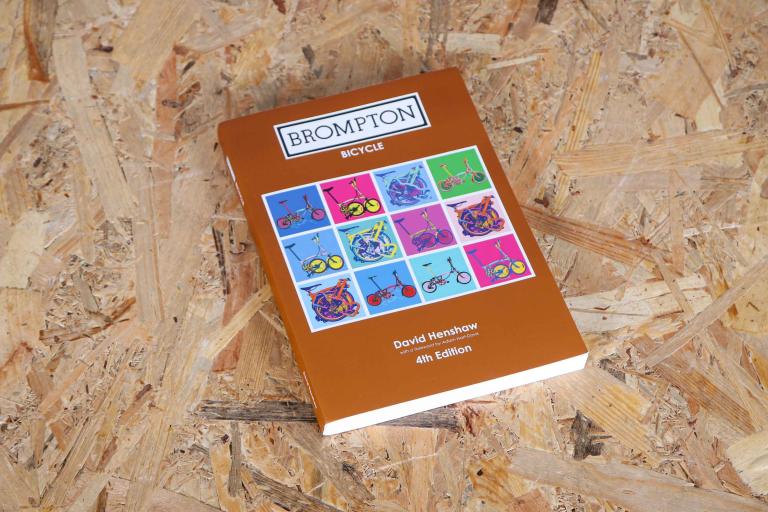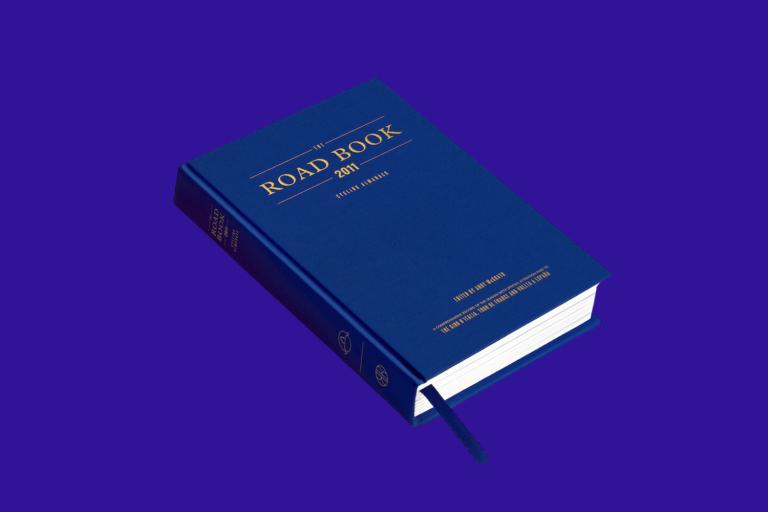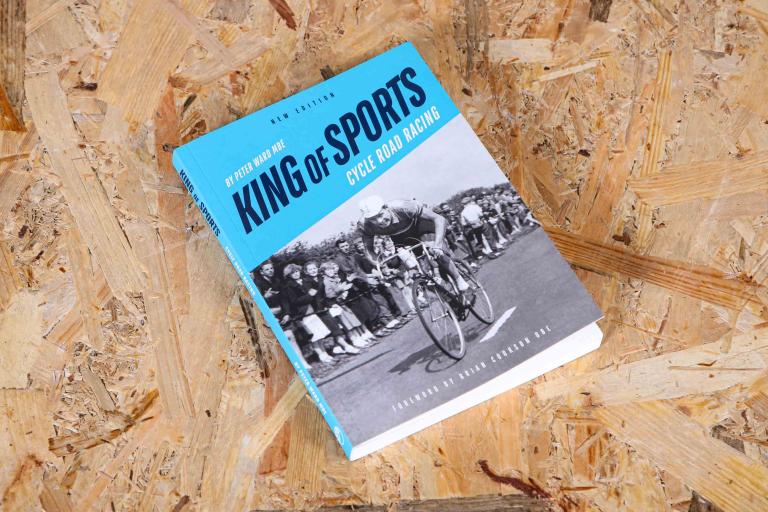- News
- Reviews
- Bikes
- Components
- Bar tape & grips
- Bottom brackets
- Brake & gear cables
- Brake & STI levers
- Brake pads & spares
- Brakes
- Cassettes & freewheels
- Chains
- Chainsets & chainrings
- Derailleurs - front
- Derailleurs - rear
- Forks
- Gear levers & shifters
- Groupsets
- Handlebars & extensions
- Headsets
- Hubs
- Inner tubes
- Pedals
- Quick releases & skewers
- Saddles
- Seatposts
- Stems
- Wheels
- Tyres
- Tubeless valves
- Accessories
- Accessories - misc
- Computer mounts
- Bags
- Bar ends
- Bike bags & cases
- Bottle cages
- Bottles
- Cameras
- Car racks
- Child seats
- Computers
- Glasses
- GPS units
- Helmets
- Lights - front
- Lights - rear
- Lights - sets
- Locks
- Mirrors
- Mudguards
- Racks
- Pumps & CO2 inflators
- Puncture kits
- Reflectives
- Smart watches
- Stands and racks
- Trailers
- Clothing
- Health, fitness and nutrition
- Tools and workshop
- Miscellaneous
- Buyers Guides
- Features
- Forum
- Recommends
- Podcast
review
 Half man half bike
Half man half bike£16.99
VERDICT:
A superbly written book about cycling's greatest champion
Weight:
0g
Contact:
All good book shops and online stores
At road.cc every product is thoroughly tested for as long as it takes to get a proper insight into how well it works. Our reviewers are experienced cyclists that we trust to be objective. While we strive to ensure that opinions expressed are backed up by facts, reviews are by their nature an informed opinion, not a definitive verdict. We don't intentionally try to break anything (except locks) but we do try to look for weak points in any design. The overall score is not just an average of the other scores: it reflects both a product's function and value – with value determined by how a product compares with items of similar spec, quality, and price.
What the road.cc scores meanGood scores are more common than bad, because fortunately good products are more common than bad.
- Exceptional
- Excellent
- Very Good
- Good
- Quite good
- Average
- Not so good
- Poor
- Bad
- Appalling
In the mid 1970's Eddy Merckx's career was beginning to draw to a close. By this time, even with just 3 tv channels - none of them showing cycling - everyone in the playground knew that Eddy Merckx was extraordinary. Looking like a cross between early Elvis and Bruce Lee, Merckx was like a swarthy brother of George Best; a brooding unpredictable hardman of cycling.
Just as every champion since has been compared to Merckx and found wanting, I've alway swerved any books on Merckx - worried that they might prove the same - the story tainted by poor writing. William Fotheringham gave us the excellent 'Put Me Back On My Bike: In Search of Tom Simpson' and thankfully he also delivers with Eddy.
Fotheringham pays a debt of gratitude to his inspiration - Geoffrey Nicholson's account of the 1976 Tour 'The Great Race' and just does what he does best. From the moment Fotheringham's met at Brussels airport by the man himself 'I didn't realise how tall he was' it's a freshly researched, snappy read that explores his formative years in Belgium: racing in a country with three languages and a fanatical cycling history. Fotheringham then energises the key moments of Merckx's career with so much freshness you feel you were there as they happened:
'The point when Merckx went from being merely superhuman to borderline supernatural was close to the top of the Tourmalet on July 15th 1969... The mystery started when Merckx was seen to be fiddling with his gears. Initially his rivals thought he must have a problem but actually he was preparing to change gear... Merckx was shifting to 53x17."
Merckx's sprint over the summit and descent of the Tourmalet put 45 seconds into the field by the valley floor. Merckx then ascended the Soulour and the Aubisque alone before racing solo for the remaining 75K to the finish.
The puzzle was that the famous four hour breakaway through the Pyrenees to Mourenx was undertaken with Merckx already leading the Tour by 8 minutes with only 6 stages to go. Tactically the breakaway was risky and made no sense. But it was glorious. The Belgian doubled his lead to 16 minutes and destroyed his rivals on his debut Tour de France.
'It was the most outlandish act of a career spent defying the norms and nostrums of professional cycling. Across his professional career Merckx rarely saved his strength. He tried to win everything he could, no matter how big or how small the race, rarely even recognising the politics of professional sport. He accepted, even embraced, the risks involved in not making friends, not calculating the values of every effort.'
Merckx admits that he was usually driven by insecurity and defended his lead by attacking to gain even more time. Fotheringham defines the common practice then that we still know so well today. 'Once an advantage is gained, it is defended, and it is extended only if that can be done without risk'. Today we're used to incremental gains, defending narrow leads with a team effort, specific teams for certain races, race radios for riders and power meters. Merckx used team help but whenever he could he just attacked and attacked again: riding people off his wheel with a dominance not seen since. This is a rider who did the double: won the Giro AND the Tour De France in the same year - 3 times - wearing woollen shorts. It was 10 years of competitive cycling with no equal. We will never see the panache of Merckx again - but still we can dream.
Congratulations also to James Jones at Yellow Jersey Press. In these days of Kindle and ibook 'Merckx' itself is a work of art. Black end pages compliment the black and white dust jacket photographs - repeated, without text, on the book cover itself with just the legend 'Merckx' in yellow and red tones on the spine.
With an excellent index (so lacking in most sports biographies) my only quibble with a very fine book is the absence of photos of Merckx's chief rivals: the dastardly 'Emperor' of Flanders cycling Rik Van Looy, the fragile, tragic Luis Ocana and José Manuel Fuentes who Fotheringham describes as 'tiny, curly-haired, stick-legged....short arms and bizarrely long legs, one of which had an obscene tangle of varicose veins'. Only one? To be kind maybe the other leg looked as if it belonged to Gina Lollobrigida.
Put it on your Christmas list - and pray Father Christmas rides a bike.
Verdict
A superbly written book about cycling's greatest champion
road.cc test report
Make and model: Merckx. Half Man, Half Bike William Fotheringham
Size tested: Hard back
Did you enjoy using the product? Yes
Would you consider buying the product? Yes
Would you recommend the product to a friend? Yes
About the tester
Age: 47 Height: Weight:
I usually ride: Dolan Prefissio - winter bike My best bike is: Condor Moda Ti - summer bike
I've been riding for: 10-20 years I ride: Most days I would class myself as: Experienced
I regularly do the following types of riding: road racing, commuting, club rides, sportives, general fitness riding, Dabble in Triathlon
Latest Comments
- wtjs 1 hour 32 min ago
That one seems so stupid and terminally illiterate, it must be an ironic spoof account
- ubercurmudgeon 1 hour 43 min ago
Even a stopped clock, etc, etc...
- Bigtwin 2 hours 59 min ago
How the actual F can you NOT go to prision for drinking vodka WHILE DRIVING A CAR!!??
- Bigtwin 3 hours 4 min ago
I wouldn't be meeting that Orange Pillock anywhere, let alone 1/2 way.
- Laz 3 hours 20 min ago
If the local police is unwilling or unable to do their job properly, then perhaps her insurance provider ought to re-evaluate the risks she poses...
- No Skinny Tyres 4 hours 59 min ago
It's a stabiliser, it was first used in WW2 to preserve chocolate in US rations. It allows the milk solids to fully dissolve, US chocolate is less...
- Martin1857 14 hours 14 min ago
As a member of the Co-op community (I live in a Housing Co-op) and a bike owner /rider, this is very sad news. We need more Co-ops not less.
- Dnnnnnn 14 hours 5 min ago
It is sad for the individuals concerned but (and this is a general point, rather than specific to this story), we're much better off overall for...
- No Reply 14 hours 56 min ago
I agree with Pogacar regarding social media. The likes of Facebook, Instagram have done untold damage, especially to the minds of young people....
- David9694 15 hours 1 min ago
Lorry carrying 25 tonnes of beer catches fire on the M11...




Add new comment
7 comments
I can also highly recommend Daniel Friebe's recent biog of Merckx (EM - the Cannibal) which was excellent. I had no idea just how much better than everyone else he was - the stuff he did was simply amazing. I'll definitely be getting this to compare and contrast the 2 accounts. Have to say drugs or no drugs I'm a fan
yes, excellent book, however very little discussion surroundings the drug taking that wasnt even a secret back then, the Anquetil cocktail as an example
Read this book during the summer. Absolutely cracking and underlines the fact of how good actually Merckx was.
53x17 on the tourmalet. That's mental.
Might have to get a copy of this.
A copy of that set up or the book?
'Half man-half bike', sounds more like The Third Policeman by Flann O'Brien.
Seriously though agree with cavasta. Merckx is proably the only name I can recall from the days when I was more into Formula 1 and cycling was something I did to complete my paper round.
Another one for the Xmas list, and if you haven't read The Third Policeman, add that too.
Fotheringham is an excellent and well-informed writer who knows his subject (cycling). Merckx has got the biographer he deserves, and we the book we yearn for.